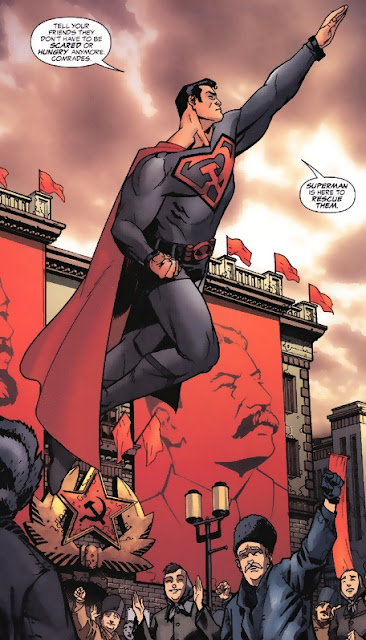What the... oh, that was awesome! This is what I thought upon reading this comic book. Superman: Red Son is perhaps one of the more preposterous and insane comics I've ever read, maintaining a perfect balance between humor and thoughtfulness. Basically, the comic book is based on a "What if?" scenario: what if Superman had landed in Soviet Russia and grown up in a Communist society. The result is both epic and hilarious, and I can definitely say that this story was a classic.
.
Shenanigans in the Fatherland
Superman: Red Son is like a man who talks seriously about social dynamics while backflipping into a kiddie pool. Somehow, this story manages to provide an interesting and fairly rational viewpoint on what the effects of growing up with Communism would have had for Superman while simultaneously poking fun at the entire concept. The art of the comic is a perfect representation of this; there is a distinct cartoony feel that is both endearing and effectively illustrates the many different reactions of the characters to the oddball events. Batman's costume, for example, is impossible to take seriously. The Cossack-style hat just... isn't Batman, but it is there. And all you can do is stare at it in disbelief.
I find myself smiling as I write this because the experience of reading the book was akin to watching a really good movie intended for kids that touches on a number of adult themes. It felt intended for kids, in a way, because much of what happens happens in a Golden Age style. For those not familiar with this term, the Golden Age of Comics is the time period where superheroes first began; an era where they said, "Great Scott!", fought mutant gorillas, and villains stole cupcakes from babies. Superman: Red Son radiates this sort of feeling, yet somehow also manages to be intellectually interesting at the same time. I don't know how it pulled it off, but the effect is simply marvelous to behold.
What is more is that this isn't a story just about Superman. It encompasses the entire DC universe, so you get to see how figures such as Lex Luthor, Batman, Wonder Woman, Green Lantern, and more would have reacted to such a bizarre change in world events. Batman's parents are shot in the Soviet Union instead of America, so he actually becomes an antagonist with regard to opposing Superman's notions of order. Lex Luthor becomes the mastermind of America's attempts to level the playing field; he essentially is paid by the government to find out how to defeat Superman. Wonder Woman serves as a powerful diplomat for her Amazonian people, and serves as a neutral party that sways from side to side as events unfold. As one can tell from this description, the 'what if' world of Superman: Red Son is fully fleshed out and, for the most part, makes sense and is interesting to watch.
.
Pride of the Soviet State
One thing that particularly interested me was the fact that Superman: Red Son addresses an intriguing possibility that I had yet to see addressed in any other comic. Essentially, it raises the question of, "What if Superman decided to rule the world?" In this comic, Superman, in short order, replaces Stalin as the leader of the Soviet state, and this expands to other members of the Warsaw Pact as well. He does this for reasons of morality; he thinks that he should use his powers to help people live happier. The end result is a grand utopia, but one that naturally comes with a number of systemic flaws.
One example is as follows. Superman decides that, to best save and defend people, he must respond to every single accident or threat as it happens. As a result, his conversations with people rarely last for more than a few minutes, and he is constantly busy zipping around the world solving problems. Part of what contributes to this is the fact that I've never seen Superman stronger; when Stalin is poisoned, Superman reads dozens of books on medicine, diagnoses the poison in question, and assigns a medical team to solve the problem; all of this in the span of a couple seconds. Similarly, when the first threat from America arises, he learns the English language en route to the trouble area; a trip of maybe fifteen seconds. But the consequence of this snappy, perpetual problem solving is that Superman becomes detached from humanity in a way similar to Dr. Manhattan of Watchmen, but not quite as extreme. This, in the end, contributes to one of the morals of the story; that Superman is not supposed to rule over the planet, and that he couldn't do it successfully even if he tried.
.
Conclusion
All in all, I ended up really liking Superman: Red Son. I was completely mystified and cautious at first; seeing this crazy stuff happen induced some early wariness. But it grew on me fast, and I really ended up liking the art style, writing approaches, and different characterizations of these comic book figures in a Soviet dominated world.
I'd say my only caveat is that, on occasion, the Golden Age slapstick madness got a bit out of hand and was used to the point where it managed to go beyond my suspension of disbelief. But, as a whole, it turned out rather charming, and I wouldn't have it any other way. Superman: Red Son is alternately freaking awesome, goofy as all hell, and thought-provoking. And that is one heck of a blend!
9/10




Actually, the era you're thinking of is the Silver Age, the era with the weirdness. It was in response to the American Comics Code restricting the stories that the publishers could tell.
ReplyDelete